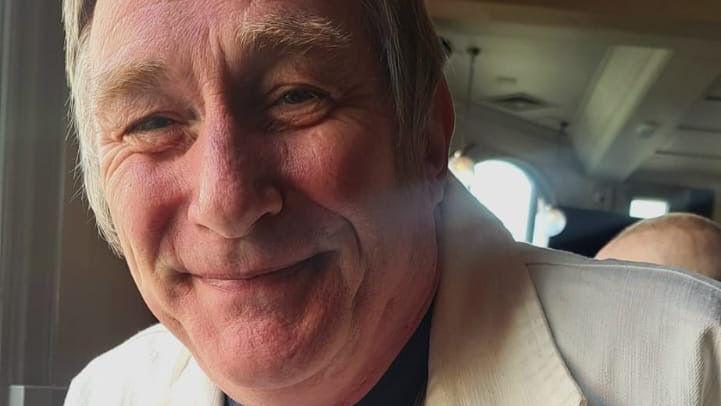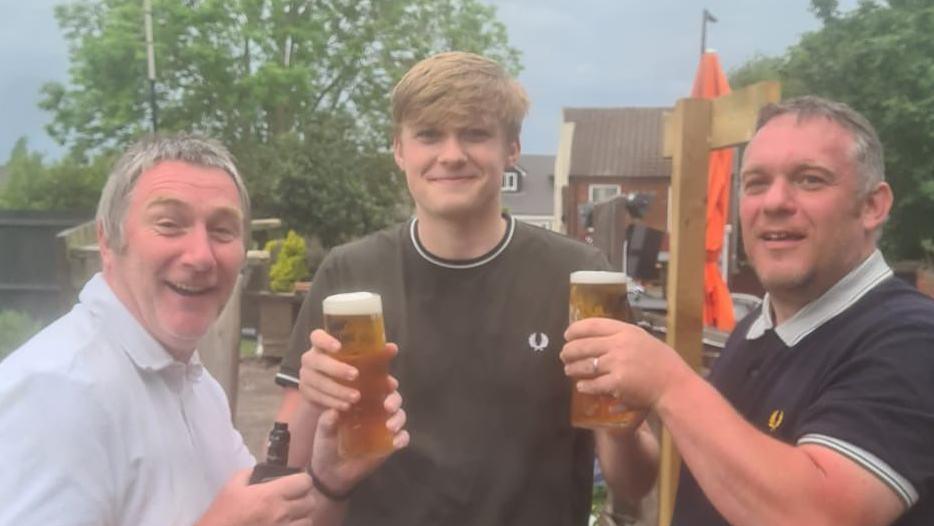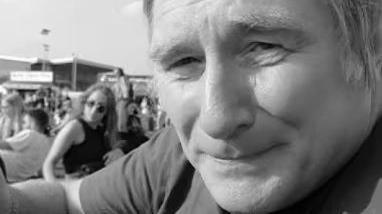'Life never same' after husband's death - inquest

Mark Townsend's wife said her husband was a "sensitive, kind, caring man".
- Published
The family of a man who suffered a fatal cardiac arrest at a football match has told an inquest into his death that "life will never be the same" without him.
Mark Townsend, 57, from Birmingham, collapsed at Hillsborough Stadium during West Bromwich Albion's away tie with Sheffield Wednesday on 28 September last year.
The inquest at Sheffield Medico-Legal Centre has been examining whether there were issues in Mr Townsend's care, which was earlier described by some witnesses as "chaos" and "a shambles".
In a statement, Mr Townsend's wife, Marion, said: "My world without Mark is now an existence, not a life. That day was as if a tornado hit, and I am looking at the crater beside me."
"I spent my life searching for something but not knowing what and, in Mark, I found it. He calmed the voice in my head and brought me peace and fulfilment," she said.
There had been an "outpouring of grief" by Mr Townsend's work colleagues at BMW, and she had found out that two younger staff members had called her husband their "work dad", she added.

Mark Townsend, left, pictured with his nephew, Matt, centre, and brother Steve, right
Mr Townsend's nephew, Matthew Townsend, told the inquest he had always attended West Brom matches with his uncle.
He had seemed perfectly well at the match until he sat down and fell onto his leg, he explained.
"I was holding him and started asking people for help. I wasn't sure what was going on. I called my dad," he said.
He said he had watched CPR being carried out on his uncle on the concourse and then, while on his way to the ambulance, "saw some paramedics laughing".
"If anything, that instilled a bit of hope because I thought, 'they're relaxed, he's going to hospital, he'll be OK,'" he said.
When asked at the inquest if he wanted to add anything more about his uncle, he said: "There won't be another."
'Very poorly heart'
Mr Townsend was pronounced dead in hospital at 14:38 BST having suffered a "massive" heart attack, the inquest was told.
Dr David Kirby, an emergency medicine consultant who was called to give expert evidence, said most people in such a situation would not survive.
He said Mr Townsend had received "gold standard" treatment because he had collapsed in the presence of a medic who did good chest compressions, and an early defibrillator shock was given.
"He had a diseased heart. He had a very, very poorly heart that was always going to struggle when this occurred," Dr Kirby said.
He praised the "very quick" delivery of the first defibrillator shock, which came about six minutes after Mr Townsend had collapsed.
Meanwhile, Dr Kirby remarked that there was "lots of factual disagreement between those giving evidence".
He said that included differences over whether ventilations had been given to Mr Townsend on the stand, or if there had been a 15-minute delay before they were started.
"If it is found that ventilation was not provided until Mark arrived on the concourse, that is perhaps, for me, quite a significant shortcoming," Dr Kirby said.
That delay, if proven, would have "more than minimally" contributed to the poor outcome in Mr Townsend's care, he explained.
The fact that Mr Townsend waited 15 minutes to receive adrenaline was "unhelpful but not deleterious", Dr Kirby added.

Mr Townsend suffered a cardiac arrest at the match between Sheffield Wednesday and West Brom
The inquest heard Mr Townsend had suffered from high cholesterol, something which Mrs Townsend said he had never been told.
She added they had built a house for their retirement in Donegal, Ireland, near where they had married in 2013, and he had visited there two weeks before his death.
"Sadly, that dream will never come to pass," Mrs Townsend said.
"I have been so lucky to experience a true all-encompassing love with Mark," she said.
"Many people do not get that in their lifetime, and I am truly grateful."
Senior coroner Tanyka Rawden listed five preliminary concerns over the care Mr Townsend received following his cardiac arrest.
She said those were the working dynamic of private and NHS paramedics; access to radios on the stand; training standards around patient extrication; unclear uniforms, and the lack of straps on the stretcher used to carry Mr Townsend.
Ms Rawden is due to give her conclusion on Friday.
Get in touch
Tell us which stories we should cover in Yorkshire
Listen to highlights from South Yorkshire on BBC Sounds, catch up with the latest episode of Look North
Related topics
- Published2 October

- Published29 September
